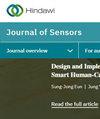Arc-Scanning Synthetic Aperture Radar for Accurate Location of Targets
IF 1.1
4区 工程技术
Q3 ENGINEERING, ELECTRICAL & ELECTRONIC
引用次数: 0
Abstract
The purpose of this article is to present the advantages that the use of arc-scanning synthetic aperture radar (Arc-SAR) would provide for accurate location of target to the weapon systems. Arc-SAR systems have an extraordinary capacity of angular discrimination of the targets, this fact make possible they can be used for the precise location of targets by replacing the large antennas required by the monopulse systems, used in this kind of applications, with a small rotating antenna. However, to carry out the real-time location of targets with the current processors a much more complex signal processing is needed. A simulator has been developed in this work, which allows the comparison of the theoretical and experimental results obtained by the classical systems against those obtained with the proposed Arc-SAR system working in the millimeter frequency bands. The results obtained demonstrate the ability of the proposed technique to accurately locate targets. This confirms that the obtained precisions allow the use the presented system in some important applications as Sense & Avoid (S&A) and weapon-pointing systems. Finally, possible applications of these techniques are described, especially useful is onboard sensors, because of the small size and weight of the antenna needed to implement an Arc-SAR system.用于精确定位目标的弧形扫描合成孔径雷达
本文旨在介绍使用弧扫描合成孔径雷达(Arc-SAR)为武器系统精确定位目标所带来的优势。弧扫描合成孔径雷达系统对目标具有超强的角度分辨能力,因此可以用小型旋转天线取代用于此类应用的单脉冲系统所需的大型天线,从而实现目标的精确定位。然而,要使用目前的处理器对目标进行实时定位,需要进行更为复杂的信号处理。在这项工作中开发了一个模拟器,可以将传统系统获得的理论和实验结果与拟议的在毫米频段工作的 Arc-SAR 系统获得的结果进行比较。获得的结果表明,拟议的技术能够准确定位目标。这证实了所获得的精确度允许在一些重要应用中使用所提出的系统,如 "感知与避让"(S&A)和 "武器瞄准 "系统。最后,介绍了这些技术的可能应用,特别是在机载传感器方面的应用,因为实施弧形合成孔径雷达系统所需的天线体积小、重量轻。
本文章由计算机程序翻译,如有差异,请以英文原文为准。
求助全文
约1分钟内获得全文
求助全文
来源期刊

Journal of Sensors
ENGINEERING, ELECTRICAL & ELECTRONIC-INSTRUMENTS & INSTRUMENTATION
CiteScore
4.10
自引率
5.30%
发文量
833
审稿时长
18 weeks
期刊介绍:
Journal of Sensors publishes papers related to all aspects of sensors, from their theory and design, to the applications of complete sensing devices. All classes of sensor are covered, including acoustic, biological, chemical, electronic, electromagnetic (including optical), mechanical, proximity, and thermal. Submissions relating to wearable, implantable, and remote sensing devices are encouraged.
Envisaged applications include, but are not limited to:
-Medical, healthcare, and lifestyle monitoring
-Environmental and atmospheric monitoring
-Sensing for engineering, manufacturing and processing industries
-Transportation, navigation, and geolocation
-Vision, perception, and sensing for robots and UAVs
The journal welcomes articles that, as well as the sensor technology itself, consider the practical aspects of modern sensor implementation, such as networking, communications, signal processing, and data management.
As well as original research, the Journal of Sensors also publishes focused review articles that examine the state of the art, identify emerging trends, and suggest future directions for developing fields.
 求助内容:
求助内容: 应助结果提醒方式:
应助结果提醒方式:


